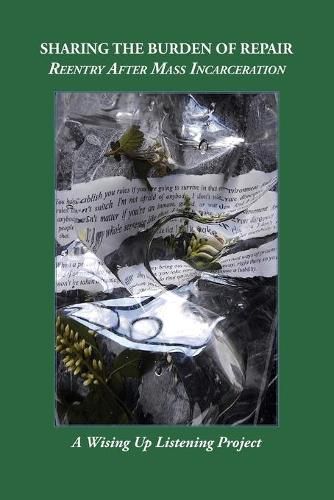Readings Newsletter
Become a Readings Member to make your shopping experience even easier.
Sign in or sign up for free!
You’re not far away from qualifying for FREE standard shipping within Australia
You’ve qualified for FREE standard shipping within Australia
The cart is loading…






This title is printed to order. This book may have been self-published. If so, we cannot guarantee the quality of the content. In the main most books will have gone through the editing process however some may not. We therefore suggest that you be aware of this before ordering this book. If in doubt check either the author or publisher’s details as we are unable to accept any returns unless they are faulty. Please contact us if you have any questions.
Sharing the Burden of Repair: Reentry After Mass Incarceration describes a six-year listening project on reentry that took place at the crest of an unusual wave of bipartisan criminal justice reform in Georgia, one of our most punishing states. Its primary intended audience is common citizens, like us, concerned about the reality of mass incarceration but unsure how to engage. Its aim is to expand, individual story by individual story, our understanding of the importance of successful reentry after an age of mass incarceration and help us take on those difficult questions: Where and how do wefit in? What can wechange?
We listened to over 200 people: formerly incarcerated men and women, families, defense lawyers, activists, employers, chaplains, juvenile courts and justice officials, diversion courts, prosecutors, judges, community supervision officers, commissioners of corrections and community corrections, and legislators involved with criminal justice reform. We heard stories people within our adversarial criminal justice system rarely share directly with one another, each with a wisdom to it that we all need.
By bringing them together here, we hope that new stories–more complex, compassionate, inclusive ones–can come into being, stories that acknowledge the lasting harms of both mass incarceration and crime andour capacities for remorse and change as individuals and as a society.
$9.00 standard shipping within Australia
FREE standard shipping within Australia for orders over $100.00
Express & International shipping calculated at checkout
This title is printed to order. This book may have been self-published. If so, we cannot guarantee the quality of the content. In the main most books will have gone through the editing process however some may not. We therefore suggest that you be aware of this before ordering this book. If in doubt check either the author or publisher’s details as we are unable to accept any returns unless they are faulty. Please contact us if you have any questions.
Sharing the Burden of Repair: Reentry After Mass Incarceration describes a six-year listening project on reentry that took place at the crest of an unusual wave of bipartisan criminal justice reform in Georgia, one of our most punishing states. Its primary intended audience is common citizens, like us, concerned about the reality of mass incarceration but unsure how to engage. Its aim is to expand, individual story by individual story, our understanding of the importance of successful reentry after an age of mass incarceration and help us take on those difficult questions: Where and how do wefit in? What can wechange?
We listened to over 200 people: formerly incarcerated men and women, families, defense lawyers, activists, employers, chaplains, juvenile courts and justice officials, diversion courts, prosecutors, judges, community supervision officers, commissioners of corrections and community corrections, and legislators involved with criminal justice reform. We heard stories people within our adversarial criminal justice system rarely share directly with one another, each with a wisdom to it that we all need.
By bringing them together here, we hope that new stories–more complex, compassionate, inclusive ones–can come into being, stories that acknowledge the lasting harms of both mass incarceration and crime andour capacities for remorse and change as individuals and as a society.